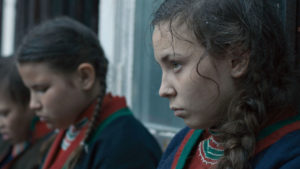 Review: Wisconsin Film Festival
Review: Wisconsin Film Festival
Sami Blood | Amanda Kernell | Sweden | 2016 | 110 min
UW Cinematheque, Friday, March 31, 1:15pm»
Sundance Cinemas, Sunday, April 2, 6:00pm»
A touching film about the relationship between region, family, and identity, Sami Blood offers a glimpse into a shameful period in Scandinavian history. Edwanike Harbour continues our 10-day Wisconsin Film Festival preview with her review.
Minorities and indigenous peoples have been oppressed and persecuted throughout history. Barely discernible physical traits, linguistic differences, or cultural issues can enable a dominant group to systematically destroy another group of people. Sami Blood offers a haunting portrayal of a young Sami girl who desperately tries to shed her identity to assimilate into Swedish society.
The Sami people are indigenous to the Northern part of Sweden bordering on Finland, also known as Lapland. Set in the 1930s, young Elle-Marja (Lene Cecilia Sparrok) must attend a Swedish boarding school that expects her to assimilate into mainstream Swedish society. The children at the school complete humiliating tests designed to determine if they have the physical traits to be true Swedes. Under the threat of corporal punishment, they cannot speak their native Sami tongue. While some of the children cling to their heritage, Elle-Marja aspires to please her teacher and shed herself of the very identity that leads to punishment.
Older Swedish boys brutally bully students who wear easily recognized, bright-colored, traditional Sami garb as they walk to and from school. Initially Elle-Marja tries to fight back but senses that the toll may be too great. Her sister, Njenna, has a strong bond with Elle-Marja, but feels it slipping away as Elle-Marja sneaks away one night to fraternize with young Swedish boys at a dance. She meets Niklas (Julius Fleischanderl) and quickly develops an attachment to the young man as he could potentially be her ticket away from home.
The cruel irony of the Elle-Marja’s life stems from the fact that while the state and school system want to squeeze the ethnicity out of the children, when she tries to further her studies by going to Uppsala, her teacher tells her “her kind” is too simple minded to navigate life in the city. They want to suppress the children from expressing their culture, but then tell them they are better off staying in the rural areas raising reindeer. Not one for obeying rules, Elle-Marja firmly resolves to make a way for herself in Sweden even if it means shedding major parts of her identity. She becomes “Christina” and continues to pursue Niklas which less than desirable results.
Elle-Marja desperately wants to find her place in Swedish society. In one brutal encounter, an older Swedish boy tells her that he can smell her on him. Later we see Elle-Marja bathing herself in a river so vigorously, it seems as if she literally wants to wash the Sami identity from her body.
In light of the identity politics we see playing center stage in our own society, this film may be difficult to watch for some people. The timeless message has a powerful impact for such a quiet film. The hauntingly beautiful scenery of northern Scandinavia gives a sense of how desolate things could be for a Sami teenager who might be curious about what else is out there. The quiet hush of the film, in addition to a Sami cultural practice called yoiking, only adds to the biting nature of the story.
Sami Blood continues the tradition of strong Scandinavian films at the Wisconsin Film Festival, dating back to the “Focus on Scandinavia” series in 2008. Through the mesmerizing performance and piercing eyes of Lene Cecilia Sparrok, director Amanda Kernell vividly reminds us that nothing is gained without something lost. The English title of this film translates into “same blood.” The idea that people can treat fellow human beings in such a cruel and savage way seems to be a lesson some of us have not quite learned.